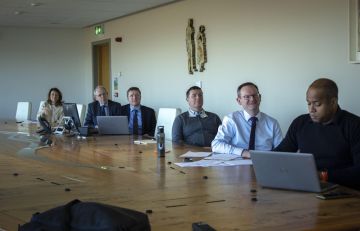SETU’s Carlow campus was one of three locations for an international seminar to review and reflect on the success of the Horizon 2020 ‘Build Resistance Through Education (BRTE)’ programme and to plan for the future of the initiative. The event was co-hosted by partners in Wolaita Sodo University (WSU) in Ethiopia and in the UCD Centre for Humanitarian Action.
The BRTE programme, which began work in 2017, sees academia working with established relief and development agencies to transform the livelihoods of communities around the world as part of the global effort to meet the commitments to the United Nations 2030 Sustainable Development Goals (SDGs).
According to Dr. David Ryan, SETU lead on the BRTE programme, “BRTE is a university wide, partnership approach which focuses the power of education and innovation to generate transformative change. Through mutual knowledge exchange we are working with our partners in WSU to build regional capacity and radically transform livelihoods of the regional population. The outcomes of BRTE can be used as a model for other regions around the world. I am incredibly grateful to my colleagues in SETU for their involvement in BRTE and to our partners and friends in WSU, UCD, NOHA and Concern Worldwide”.
Ambassador Nicola Brennan, Irish Ambassador in Addis Ababa, Ethiopia joined Professor Takele Tadessa, President of Wolaita Sodo University, Dr Patricia Mulcahy, Vice President for Development, SETU and Professor Dolores O’ Riordan, Vice President for Global Engagement, UCD in congratulating participants on the success of the BRTE programme and offered their support in informing and shaping additional initiatives in this critical area of endeavour for higher education.
Addressing the event Dr. Mulcahy said, ‘It is a great credit to everyone involved in the BRTE project that work continued throughout the global pandemic, the conflict in the Tigray region, and the ever increasing impact of climate change, and that you have come together today to reflect on the past five years, to evaluate the outcomes, and to consider the next steps in this important work.’


